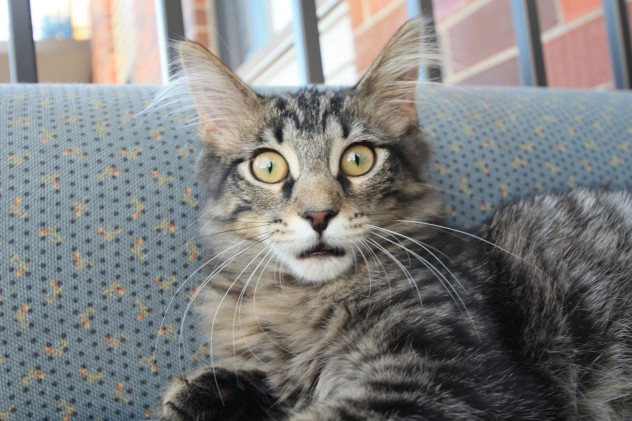Would you eat your pet cat?

I read this article to my pet cat, Sam.
His response?
A cold stare as if to say, "You unspeakable animal."
As distasteful as it sounds in both meanings of the word, there are areas in our world where hunger is such that pet cats are consumed as food. If we're hungry enough, we'll eat anything, including each other. In many parts of the world, hunger is a daily ordeal. In the developed world, we look at this practice as pitiful and disgusting - until our food supplies run out.
Even if you or I are well prepared for a disaster, food and especially water supplies are limited. I remember reading one estimate that in a power failure a community will run out of drinking water as soon as the municipal water system runs dry in a day or two. Food supplies will last a bit longer, in most communities between three and seven days.
And then what?
Survival of the most willing to do what must be done to survive? Probably. I doubt that most people ever consider how fragile our food and water systems are. Without nightly deliveries of foodstuffs to supermarkets, the shelves would be bare in two or three days. Without electric pumps, water will last a day or two.
Something to think about.
Here's the report with a link to the full report in the attribution.
* * * * *
In most Western cultures cats are simply feline pet companions eager to greet us at the end of the day. In continents such as Asia and Africa, the social norms surrounding cats are very different; our furry friends commonly double up as dinner for a number of reasons ranging from food insecurity, simple preference or superstition. It is estimated that 4 million cats are consumed annually in Asia alone. Raymond Czaja et al recently conducted research on cat consumption in Anthrozoös. Their study reveals motives for, prevalence and methods of cat consumption in Madagascar and resulting public health implications for Malagasy citizens and beyond.
 |
| The Unthinkable: Who Survives When Disaster Strikes - And Why by Amanda Ripley Purchase new or used from Powell's Books |
Food insecurity as motivation for eating cat
Czaja conducted interviews on 512 randomly selected Malagasy citizens. They were questioned about general meat consumption habits to assess food security and more specifically about cat consumption, if they'd eaten it and if so when and why. 34% of interviewees had consumed cat, though none stated a preference for it. Most had eaten their household pet cat because it was old, fat or naughty, a high percentage trapped and ate cats and a few ate road killed cats. Few cited food insecurity as motivation for eating cat, suggesting opportunistic reasons prevail; cat is a cheap source of protein. A minimal few preferred not to eat cat due to taboos, distaste or for ethical reasons.
Though cat consumption provides useful protein supplementation in poor diets, it has major public health implications.
- Dead and road killed cats are perfect hosts for parasitic diseases such as Lyme disease or relapsing fever, a real mortal danger to pregnant women and infants.
- Cats are primary hosts to the parasite causing toxoplasmosis; a fatal disease to immunosuppressed HIV infected patients and threat of serious deformities in infants.
- Cat meat also threatens transmission of bacterial infections such as Clostridium botulinum.
Related stories:
- Bad News: We're Not So Different From Earliest Humans
- Cat Domestication Traced to Chinese Farmers 5,300 Years Ago
- Depression Links Partner Violence & Food Insecurity
- Egyptians May Have Domesticated Cats Earlier Than Thought
- Here, kitty, kitty, kitty. Humans met sabre-tooth cats 300,000 years ago
- Human activities jeopardize future generations
- Is the Human Food Chain Collapsing? Some Researchers Say 'Yes.'
- Kill One or Kill Five? How People Respond to Moral Dilemmas
- Neandertal ritual or Neandertal cannibalism?
- New Stone Age Evidence of Cannibalism
- The Simpsons Crazy Cat Lady and Her Psychiatric Illness
I was diagnosed with Parkinson’s disease four years ago. For over two years, I relied on Levodopa and several other medications, but unfortunately, the symptoms kept getting worse. The tremors became more noticeable, and my balance and mobility started to decline quickly. Last year, out of desperation and hope, I decided to try a herbal treatment program from NaturePath Herbal Clinic.
ReplyDeleteHonestly, I was skeptical at first, but within a few months of starting the treatment, I began to notice real changes. My movements became smoother, the tremors subsided, and I felt steadier on my feet. Incredibly, I also regained much of my energy and confidence. It’s been a life-changing experience I feel more like myself again, better than I’ve felt in years.If you or a loved one is struggling with Parkinson’s disease, I truly recommend looking into their natural approach. You can visit their website at [www .naturepathherbalclinic .com.] info@naturepathherbalclinic .com